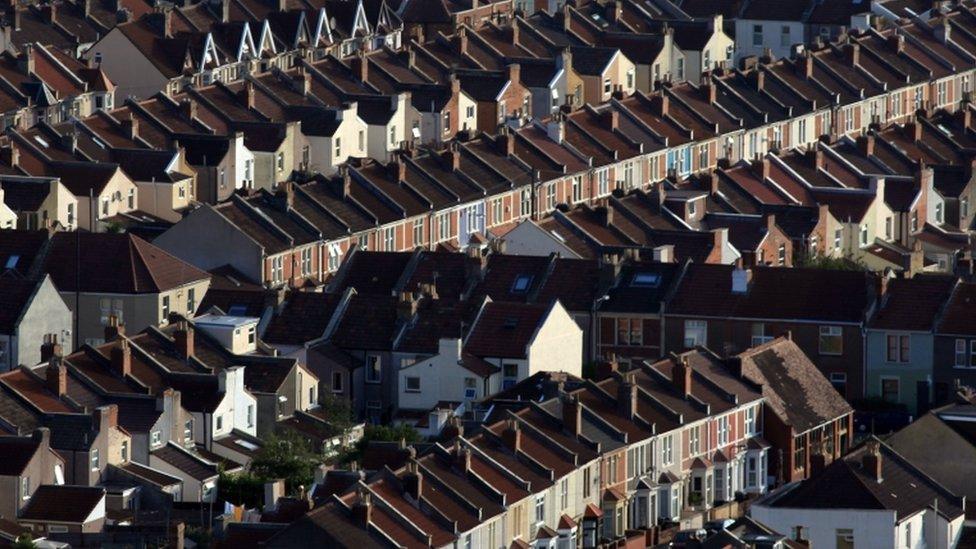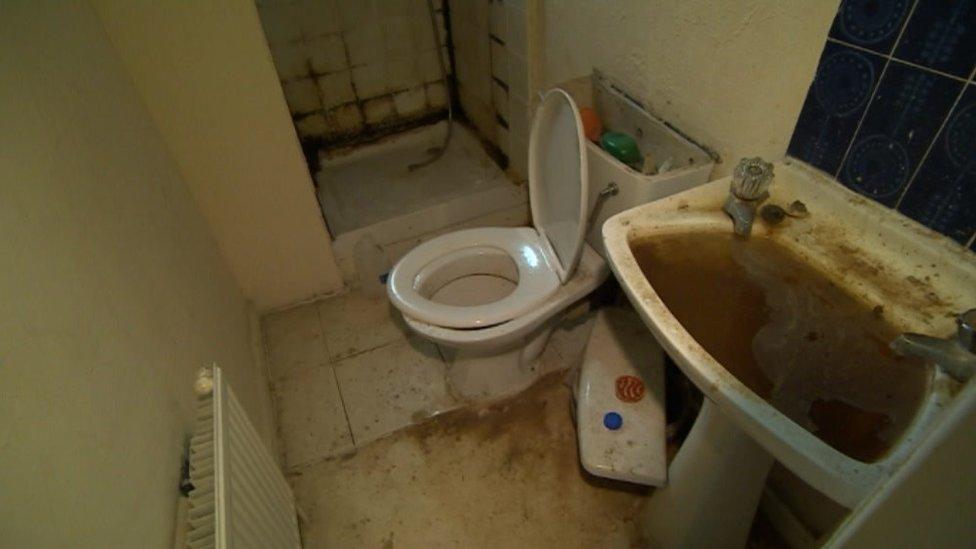Bristol housing: 'Fix the broken rental system'
- Published

Bristol currently has 30% of households renting privately
Tenants in Bristol are calling on the city council and government to "fix" the city's "broken" rental sector.
In Bristol, 30% of households are privately rented, external compared to the national average of 19%.
Campaigners said the cost of private rents in Bristol had gone up 52% since 2011, external, but wages had only risen by 24%, external.
Bristol City Council said it is working to tackle poor conditions in rental properties and continues to prosecute rogue landlords.
Housing charity Shelter is backing the Bristol Fair Renting campaign and said the local rental market was "unfair", and was "causing homelessness".
Manager at Shelter's Bristol hub, Penny Walster, said rents in the city were too expensive and unstable.
"Too many people are living in poor conditions, and many are being barred from renting a home altogether just because they receive housing benefit," she said.
The campaign is calling on city leaders to lobby government for more local powers to ensure landlords charge fair rents and to protect renters from retaliatory evictions.
They are also asking the council to create a local action plan to remove 'No DSS' policies which they claim are discriminatory.
A spokesman for Bristol City Council said: "In Bristol, there are currently three housing licensing schemes in operation and one proposed scheme at the consultation stage as we look to further improve both the accommodation, conditions and management practices in privately rented and multiple occupied properties in the city.''

Kate Bower and Elena Stephenson both said they had faced issues finding good quality accommodation
Campaigner and tenant Kate Bower, 51, said when searching for somewhere to live in the city a few years ago, out of 100 adverts she found, she could only afford seven of them.
"Six of those said I was too old, and when I read the small print on the only remaining advert it said 'no DSS'.
"I ended up, despite being ill, having to move all my things into temporary accommodation, with friends of friends whose house was up for sale."
Maintenance of rental accommodation is another area where campaigners are fighting for change.
Renter Elena Stephenson, 22, said: "The conditions of rented houses are often appalling, and as tenants you have no power.
"It takes a week for someone to come out and just look at my broken oven before calling someone to actually fix it.
"You can complain to your landlord, but if they don't respond what can you do?
"You're always scared to push too far out of fear you'll be given a section 21 eviction, external - just for standing up for your right to a decent home."
Room without windows
Renter Jennifer Little, 26, said that during the pandemic she was working full-time from a room she rented for £500 per month, but which had no external windows.
"I would spend the majority of my day not being able to see daylight or let in fresh air.
"Moreover, the room was constructed with thin walls so I was constantly woken up by the slightest sound. I had no privacy, couldn't get enough sleep to work effectively and was hugely unhappy."
Ms Little said her agency told her she would need to pay the remainder of her rent to break her contract.
She contacted Environmental Health at Bristol City Council, and their advice was for the landlord to install a small internal window which led into the hallway, and which didn't receive any daylight.
Ms Little said she could not afford to break her contract, so she moved into a second, more expensive room in the property.
This required her to sign a new contract, which she is waiting to end.
A council spokesman added: "Where private tenants are experiencing problems with their rental conditions that have not been resolved with their landlord, they can contact the council's private housing team via the website problems with your property, external for assistance, advice and further support."

The campaign is urging city leaders to address the power imbalance between landlords and tenants
In a statement, the Ministry for Housing, Communities and Local Government (MHCLG) said: "Everyone should have the same opportunity when looking for a home and discriminating against someone simply because they receive benefits is simply wrong.
"That's why we have been working with landlords and letting agents to make sure that prospective tenants are treated on an individual basis and that benefits are not seen as a barrier to giving someone a place to live.
"We expect councils to enforce standards in privately rented homes and they have a legal duty to act if they discover serious hazards, and have given councils powers to require landlords to make necessary repairs to their property, backed by funding.
"We will repeal section 21 to improve security for tenants and strengthen the rights of landlords. Legislation will be brought forward in due course."

Follow BBC West on Facebook, external, Twitter, external and Instagram, external. Send your story ideas to: bristol@bbc.co.uk , external
- Published16 November 2020

- Published15 November 2019

- Published3 April 2019

- Published16 February 2018
